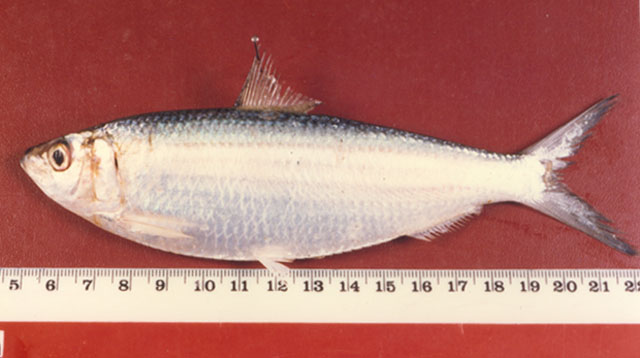
|
Sardinella fimbriata (Valenciennes, 1847) Fringescale sardinella |
||
Fringescale sardinella Tamban, Lao-lao, Lao-lao, Laolao, Lapad, Lawlaw, Lison, Lupoy, Pulang-nguso, Salinyasi, Salinyasi, Silinyasi, Tabagak, Tabagak, Tabagak, Tamban, Tamban, Tamban, Tamban, Tamban, Tamban, Tamban, Tamban, Tamban lirayan, Tamban-yapad, Tayapad, Tiyo, Tuloy, Tuloy, Tunsoy, Tunsoy, Turay, Tinapa, |
||

|
|
photo by
Devarapalli, P. |
| Family: | Clupeidae (Herrings, shads, sardines, menhadens), subfamily: Dorosomatinae | |||
| Max. size: | 13 cm SL (male/unsexed) | |||
| Environment: | pelagic-neritic; depth range 0 - 50 m | |||
| Distribution: | Indo-West Pacific: from Kuwait to southern India and Bay of Bengal to the Philippines, also eastern tip of Papua New Guinea. Often confused with Sardinella gibbosa in Indian waters. | |||
| Diagnosis: | Dorsal spines (total): 0-0; Dorsal soft rays (total): 13-21; Anal spines: 0-0; Anal soft rays: 12-23. Body somewhat compressed but variable; total number of scutes 29 to 33. Vertical striae on scales not meeting at center, hind part of scales with a few perforations and (in Indian Ocean specimens) somewhat produced posteriorly. A dark spot at dorsal fin origin. | |||
| Biology: | Forms schools in coastal waters. Misidentifications (especially with S. gibbosa in Indian waters and S. albella in the western Indian Ocean) make published biological data potentially unreliable. Marketed fresh, dried-salted, boiled or made into fish balls. | |||
| IUCN Red List Status: | Not Evaluated (Ref. 96402) | |||
| Threat to humans: | harmless | |||
| Country info: | Enters river mouths (Ref. 94476). Marketed fresh, as dried 'tuyo', or as salted or smoked 'tinapa' (Ref. 2858). Kench-cured 'balbakuwa', a heavy salting of fish, is cooked fried, grilled, boiled, or sauted (Ref. 2858). Also Ref. 393. | |||
| Entered by: Binohlan, Crispina B. - 17.10.90 |
| Modified by: Bailly, Nicolas - 15.07.13 |
| Checked by: Froese, Rainer - 18.03.94 |